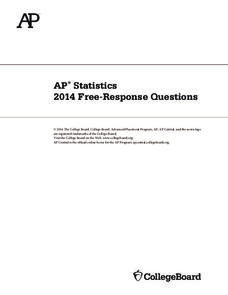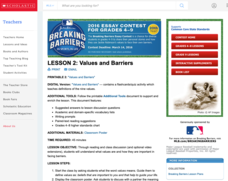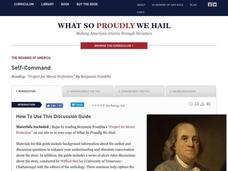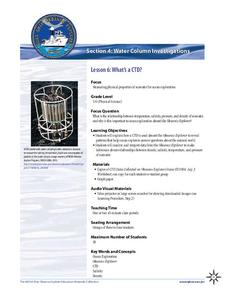College Board
2014 AP® Statistics Free-Response Questions
Turn a summative assessment into a formative assessment! The 2014 AP® Statistics exam shows learners the level of difficulty they will encounter on their end-of-course exams. Within the six items, the test highlights concepts such as...
College Board
2016 AP® Statistics Free-Response Questions
Test your classes on their knowledge of advanced statistic concepts. Young math scholars get a sneak peek at the end of course AP® statistics exam with the released items from the 2016 test. The six-question free response exam addresses...
College Board
Special Focus: Inference
Statistics is all about making inferences! A lesson guide explains the meaning of inferences and how to use statistics to make them. The resource provides instruction as well as information about the topic on the AP® Statistics exam.
CCSS Math Activities
Smarter Balanced Sample Items: 7th Grade Math – Target G
Don't leave learning to chance! Assess your class's understanding of random sampling and making inferences using questions from the experts at Smarter Balanced. As the seventh of nine parts in the Gr. 7 Claim 1 Item Slide Shows series,...
Scholastic
Lesson 2: Values and Barriers
Scholars investigate and discuss the importance of values and how they can be used to break barriers. Small groups work collaboratively to examine the text and draw inferences to answer questions. A writing assignment challenges pupils...
American Statistical Association
Confidence in Salaries in Petroleum Engineering
Just how confident can we be with statistics calculated from a sample? Learners take this into account as they look at data from a sample of petroleum engineer salaries. They analyze the effect sample size has on a margin of error and...
American Statistical Association
More Confidence in Salaries in Petroleum Engineering
Making inferences isn't an exact science. Using data about salaries, learners investigate the accuracy of their inferences. Their analyses includes simulations and randomization tests as well as population means.
CPALMS
Analyzing Vonnegut's View of the Future and His Commentary on the Present in Harrison Bergeron
Kurt Vonnegut's short story "Harrison Bergeron" engages adolescents with its theme about the dangers of complete societal equality. Learners complete a graphic organizer to track literary elements in the story, as well as an inference...
K12 Reader
Little Women: Helping Father
Jo's decision to sell her hair to bringing her wounded father home is a pivotal and poignant scene from Louisa May Alcott's Little Women. Class members read the excerpt and answer four questions about the details, vocabulary, and plot...
Great Books Foundation
The Fox and the Stork
Young readers take part in a meaningful discussion following a reading of Aesop's fable "The Fox and the Stork." Five questions focus on the characters' actions and offering apologies.
Great Books Foundation
Picture-Books in Winter
Five questions challenge scholars to make inferences after reading a poem, "Picture-Books in Winter" by Robert Louis Stevenson.
Great Books Foundation
The Glass of Milk
It's not easy to ask for help. Learn why a boy on a ship struggles with accepting help in "The Glass of Milk," a short story by Manuel Rojas. Six discussion questions prompt class members to make inferences from the text about character...
Physics Classroom
Charge Interactions
Has your class been repelled by your previous magnetism lesson plan? Try a fun interactive instead! The activity, part of the Static Electricity series, challenges scholars to infer the charges of a group of magnets based upon their...
National Park Service
A Tale of Two Men
Theodore Roosevelt and the Marquis de Mores were both born in 1858, and both came to the Dakota territory in 1883, but they influenced the developing country of America in different ways. Elementary and middle schoolers apply written and...
Science 4 Inquiry
The Ups and Downs of Populations
Life has its ups and downs ... especially if you're an animal! Biology scholars engage in a population study through an inquiry-based lesson. Pupils work together to explore the factors that affect deer populations, then examine the...
What So Proudly We Hail
The Meaning of America: Self-Command
Even for one of the most accomplished men in American history, there was room for improvement. Challenge high schoolers to use Benjamin Franklin's Project for Moral Perfection to analyze text, make inferences, connect to historical...
DiscoverE
Designing Highway Interchanges
How do engineers determine the most efficient highway designs? Introduce young scientists to the world of topology, the branch of mathematics that examines how things are connected. Teams use model highways to create the most...
Colorado State University
Why Are Clouds White?
Is it possible to change the color of clouds? A three-part activity explores the scattering of light by the water droplets that make up clouds. After observing a demonstration, curious scholars conduct their own investigations of the...
Colorado State University
How Can You Demonstrate the Different Efficiencies of Different Light Bulbs?
Need a bright idea for an engaging lab? Watch your class light up as they explore the difference in efficiency between incandescent and LED bulbs! The resource makes use of simple materials and encourages learners to infer what's...
Colorado State University
If You Can't Predict the Weather, How Can You Predict the Climate?
Why is the weather man wrong so often? Young climatologists discover how chaos rules both weather and climate through a math-based activity. Using an iterative equation, the class examines how small day-to-day weather events total up to...
Royal Society of Chemistry
Mass Changes in Chemical Reactions—Microscale Chemistry
What better way is there to introduce conservation of mass than a few simple experiments? Young chemists conduct two chemical reactions, take the masses of reactants and products, then compare their results to determine differences in...
NOAA
A Quest for Anomalies
Sometimes scientists learn more from unexpected findings than from routine analysis! Junior oceanographers dive deep to explore hydrothermal vent communities in the fourth lesson in a series of five. Scholars examine data and look for...
NOAA
The Oceanographic Yo-yo
How does chemistry help deep-sea explorers? Part four of a five-part series of lessons from aboard the Okeanos Explorer introduces middle school scientists to technologies used in ocean exploration. Groups work together to analyze data...
NOAA
What's a CTD?
Why are the properties of the water important when exploring the ocean? Young scientists discover the tools and technology used in deep sea exploration in the fourth installment in a five-part series. Groups work together to examine...

























